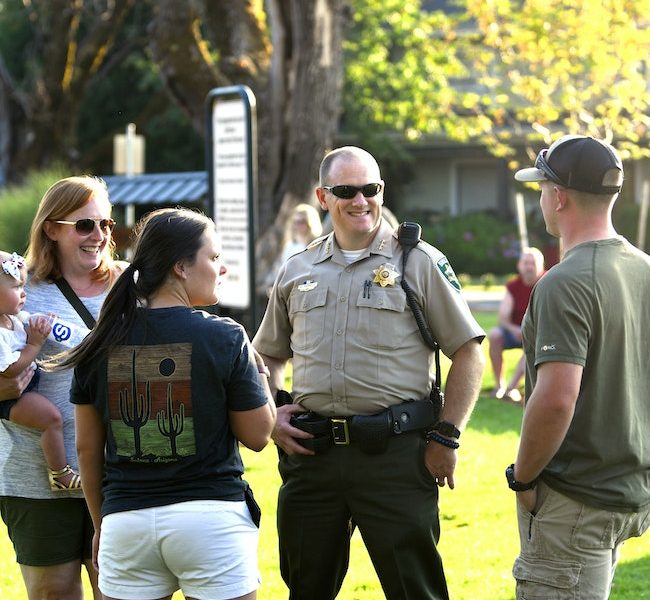 Sheriff Clifton Harrold chats with residents during the National Night Out.
Sheriff Clifton Harrold chats with residents during the National Night Out.
I grew up the son of a house painter, and I know a little bit about brushes. My brothers and I worked for our dad during high school summers and in our college years, teasing each other about who was the “roller man” and who was trusted to “cut” the edges where the walls and ceilings met. If you were a “brush man,” it indicated a higher level of skill. A few more bucks from dad, perhaps.
The broad brush? The person pushing the roller up and down the widest parts of the wall? There isn’t much skill or finesse required; one needs only to be mindful of paint splatter. It doesn’t take much thinking to accomplish that task.
Right now, there’s a broad narrative in our country regarding law enforcement. And that’s a good thing.
It’s painting everyone with a broad brush. And that’s a bad thing.
I’ve lived this same experience in another context, too.
Through 40 years working in “the media” I’ve yet to meet anyone who would qualify as an “enemy of the people.”
Do national corporations and multi-state newspaper conglomerates have their own agendas? Could a one-off small-town publisher print or broadcast extreme views? Of course. But those outfits have nothing to do with The Chronicle, or hundreds of other credible news sources.
All of this comes to mind after this past Saturday morning, having “coffee with a cop,” so to speak. Lane County Sheriff Clifton Harrold had stopped by his hometown paper’s newsroom in Creswell, with a troubled mind and a heavy heart. Make no mistake, however; he was focused, clear and determined.
He needed to break through the thundering narrative around law enforcement, he said. Separate the signal from the noise. He needed to draw a distinction: Please don’t paint his office and deputies with a broad brush.
I’ll add this observation: He’s on it.
Harrold hears the national narrative; he watches the same videos we all do, and he witnesses behavior that is foreign to him, his department, his community. His upbringing.
“I understand the calls and the ideas behind defunding the police,” he says in a calm, considered voice. “We’ve done that already in many ways. We’re constantly evaluating how we’re spending our money and using resources. Redeploy money? If you’ve got it, you should be redeploying it as appropriate. Are there bloated police budgets out there in America? I’m sure there are. It’s not a one-size-fits-all problem or solution … nationwide there is disparity.”
In Lane County, however, there is no meat to cut from the bone – because he’s already redeploying resources: There are six full-time employees who focus on mental healthcare. “Our team of mental health professionals meet with the ‘police’ side and work on inmate management plans. We’ve invested what little resources we have into smarter policing techniques – in the jail and on the street.”
It’s not just talk. In today’s parlance, he has the receipts.
Tracking use of excessive force is one of the reforms being trumpeted around the country.
“We’re all for tracking this kind of data, and, in fact, the Lane County Sheriff’s Office has been part of a national excessive force database for nearly 20 years,” he said. “It’s ingrained. When we recently had the opportunity in 2019 to add more data to the project, we immediately signed up. Not every department did. It was a no-brainer for us. We have a multi-step review and approval process regarding any use of excessive force. It gets reviewed over and over, at each step, by various levels of the department.”
Of course, even the best systems have to be executed by a human. How do we know these reviews aren’t a series of rubber stamps?
“I’ve disciplined a Lieutenant and Sergeant,” he’s quick to note, “for being outside the scope on this.” Even when a review of excessive force goes through the process cleanly, he said, “we send it to our training supervisor for further assessment to see if we could coach and train any differently to avoid the situation in the first place.”
Like I said, he’s on it.
“We don’t get many complaints … because of our culture.” He’s not bragging, and there’s not a whiff of arrogance. It’s a straightforward statement and said with humility. While he’s put in the elbow grease to help mold that culture, he doesn’t want to jinx his good fortune. “I work with so many great people,” he says. Later during the discussion he smirks self-consciously after realizing he used that same line a few more times.
Steve Spurrier, the legendary football coach, used to say this when his team committed a high number of penalties: “Stupid players must have stupid coaches.” The opposite is true on Harrold’s team.
One of the keys to creating good cops and good-cop culture? It’s training. Cutting-edge, people-focused, cross-discipline training.
“We hire people into the jail first,” he explained with a tone and seriousness that felt like he was revealing Col. Sanders’ secret ingredients.
“Those skill-building opportunities just don’t exist elsewhere. Think about it. A new deputy might pull over someone for a traffic violation and have, what, a five-minute interaction with that person? Maybe they let them go with a warning, maybe they give them a ticket. But that’s it. That’s the interaction.
“When a new deputy works in the jail first, they deal with inmates all day, for entire shifts. The deputy goes home, has dinner with their family, gets up the next day and goes in to work and sees the same inmates throughout the day. Day after day.
“You can’t solve everything in jail with handcuffs and an arrest. You have to learn how to de-escalate, find solutions, build relationships.
“Then those skills move to the streets, and how much better are our deputies ready to deal with difficult people and situations?”
“And when they go into our training program, they hear from me, directly, right at the beginning. They hear my voice and see me explain what’s required.”
They will hear about the sheriff’s PRP Communications initiative (Polite, Respectful, Professional), the importance of de-escalation, and how the LCSO is dedicated to “train the trainers.”
Sound familiar? These are all things reformers are calling for now.
He’s on it.
Things don’t happen by accident. This is deep, critical thinking about growth and development for his staff, inmates, potential criminals and for better serving the community. For us.
“The people I have around me are so great. We’re constantly rethinking and refining resources, training, culture … I want folks in this community to know how we operate, how we treat people and how we do our jobs.”
The sheriff grew up in Creswell, graduated from the local high school, and still lives here. It’s his town. And he embodies the best of what you hope Creswell is all about.
“I want to help people understand what we’re doing in this community,” he said.
The LCSO website has tools and information to help you navigate its services. He works with his team to make sure the information is relevant, accessible, pertinent. It’s not on there by accident.
Harrold utilizes retired officers to handle background checks on new hires; the wily veterans know all of the blind spots to check. They’re not looking for perfection, and nobody gets it right with every new hire.
According to Harrold, it all comes down to this: “Character matters.”
“We can teach people the tasks and skills,” he says. “It’s the stuff inside you have to really understand.”
Like I said, he’s on it.
Noel Nash is publisher of The Chronicle.







